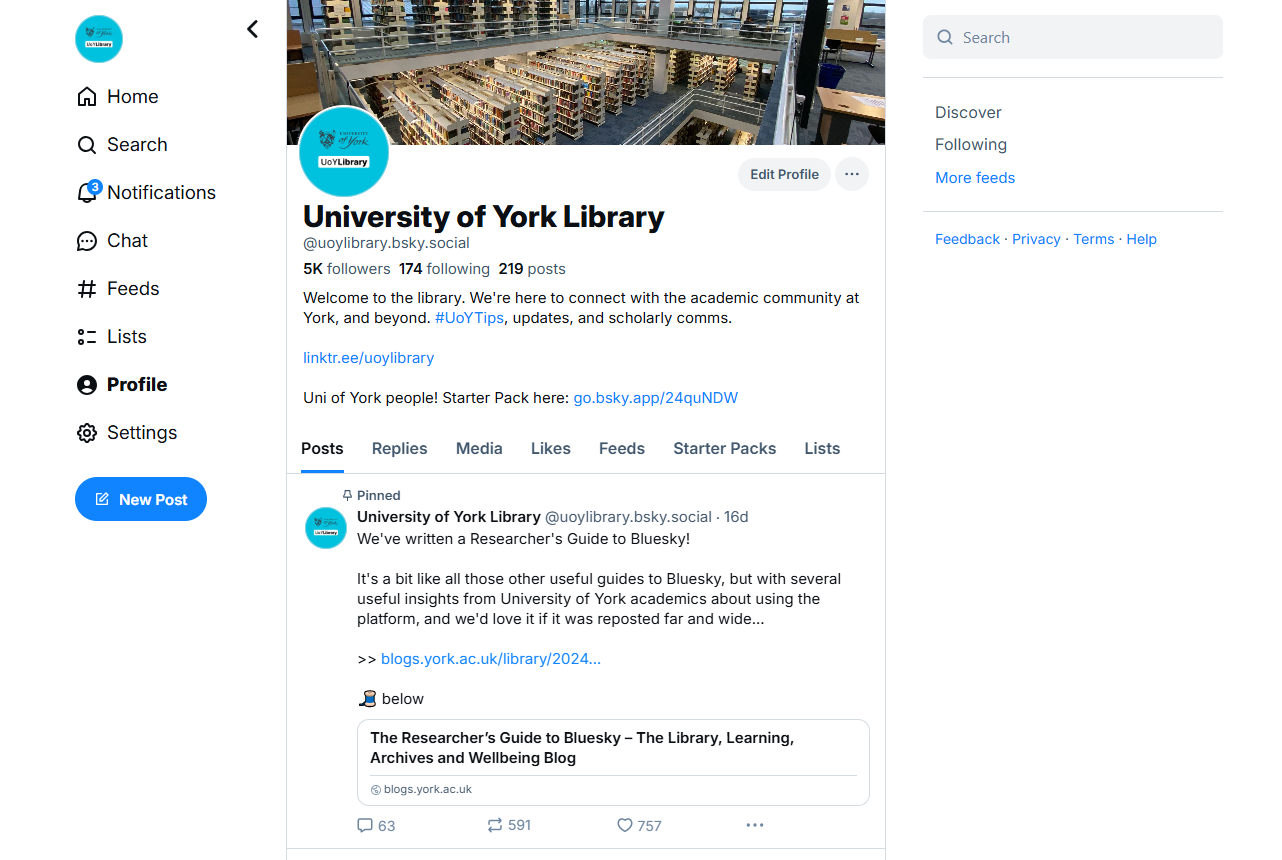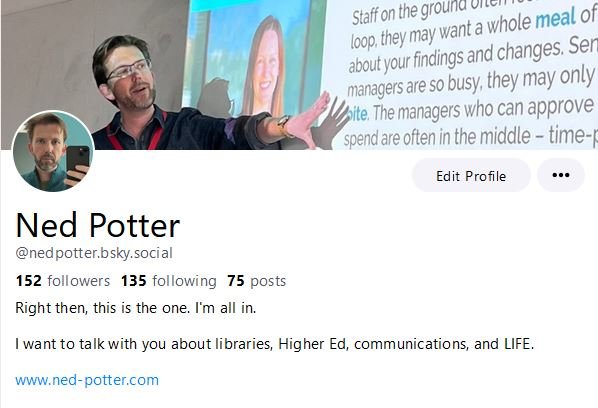If you’re reading this you probably know the emerging social network Bluesky has had an explosion of popularity. I wanted to set up a profile for my library, but I needed it to be worth it - we needed a critical mass of University of York people there to rebuild our former Twitter network.
With that in mind I decided to adapt a Bluesky guide I’d written on here, to make it a guide for Researchers - the idea being to make it as easy as possible for people to make the switch. In other words, I’ve tried to help catalyse the change I needed in order to justify putting time into Bluesky, and I think overall this approach actually worked!
Because the guide was aimed at academics in particular, I sought input from academics at York who were already on the platform. Would you like to be in a York Starter Pack I asked them, and do you have any tips for your peers? They were all terrifically enthusiastic about the idea for the guide, and gave lots of useful quotes - the researcher perspective was essential, so I’m grateful to them all. I also got permission from the Central Comms Team at the University to do this in the first place, sharing a draft with them and adding some pointers around policy which they wanted included.
1: The Researcher’s Guide to Bluesky
>> Here, then, is the Researcher’s Guide To Bluesky.
It’s published on my library’s blog rather than on here because I wanted it to be seen as an ‘official’ output of the Library & Archives. I promoted it via staff newsletters, asking the Central Comms Team to add it to their Bluesky guidance, and of course going back to each and every York academic I’d spoken to about the platform to share a link with them.
I also used it to launch the library’s Bluesky account. I thought this would be good - you can’t beat being USEFUL to hit the ground running on a new social media platform - but considering we had no followers and Bluesky doesn’t have a centralised algorithm to push content towards people, I’m fairly stunned about how much engagement we got. At the time of writing it is exactly three weeks since we posted a link to the guide (as part of a larger thread outlining its key points) and we’ve had over 600 reposts and 750+ Likes - plus so, so many replies, pins, and messages of thanks.
We've written a Researcher's Guide to Bluesky! It's a bit like all those other useful guides to Bluesky, but with several useful insights from University of York academics about using the platform, and we'd love it if it was reposted far and wide... >> blogs.york.ac.uk/library/2024... 🧵 below
— University of York Library (@uoylibrary.bsky.social) November 13, 2024 at 12:17 PM
[image or embed]
The great thing about the guide doing so well is it exposed us to new followers (including York people who may not otherwise found us), established some credibility for us as an account worth listening to, and literally brought more researchers to the platform which was of course the main driver for writing it in the first place. We now have around five-and-a-half thousand followers after 21 days - on Twitter we had around 7,500 (before Musk took over and everyone left) but that took us 12 years, and engagement was way lower than it is on Bluesky.
As successful as the guide was, the fact is the York blog on which it was posted isn’t well known enough for people to just randomly stumble across it - you need to be sent there via a link in an email or a Bluesky post, realistically. I wanted to reach more researchers through an existing authority with an established network, to get more eyes on the guide - so I pitched a version to the LSE Impact Blog for Social Sciences. You’re probably familiar with this but if you’re not, the key thing to know is it has completely out-stripped the original purpose that gave it its name! The blog has become a sort of academic hub for ideas and practical guides for people across all disciplines in Higher Education.
2: How to get started on Academic bluesky
>> Here, then, is How To Get Started With Academic Bluesky.
The above is a shorter version of the first guide, due to the Impact Blog’s word-count limit - it has the York-policy-specific parts omitted, and is generally leaner. It also benefits from some helpful suggestions given to me by Michael Taser, the Managing Editor (the final paragraph in particular) and in general I prefer this edition of the guide.
This version has also had a great reception and achieved the aim of reaching more people, hopefully bringing more researchers to the platform (which will in turn make it more useful for the York academics, meaning more of THEM will come to the platform, meaning the time WE are putting into it becomes more worthwhile, and so on and so on). Certainly the greater reach of the Impact blog has helped a lot - it’s had probably around 150% of the views of the original guide.
As more and more libraries started to appear on the Bluesky as part of its November popularity surge, it was inevitable that I’d end up writing yet another iteration…
3: The Library Guide to Bluesky
>> Here, then, is the Library Guide to Bluesky.
The edition is published here on this blog because it’s written ‘as me’, rather than as the library itself. This is a culmination of what I’ve learned and applied from writing the other guides, with some advice on actual content thrown in there as well.
Again I’d like to reach a wider audience than I can get to on this blog alone, so I’ve pitched a version to Library Journal and we’ll see what they say. Speaking of pitches…
4: a bluesky guide for academic departments and professional services
>> Here, then, is the University Guide to Bluesky.
I pitched a guide to the Times Higher (for whom I’ve written a couple of pieces previously), again on the grounds that reach will be higher there than here, with my target audience. This version is organisational rather than individual, and very much HE in nature - although much of it could apply across the cultural sector.
And that will be that - no more Bluesky guides from me (almost certainly!) and all bases covered. Taking experiences and chunking them up into (hopefully useful) guidance for others has always been one of my favourite things, so I’ve actually really enjoyed this whole Bluesky business… One reply I got to a Bluesky post sums up why it’s worth the time to write these:
“So appreciated!!! From little tips to engagement and the starter packs. You have no idea how helpful this is when you’re doing this in addition to the ‘day job’ but also trying to inform/advocate for your colleagues/researchers that you support in a newish area of social media! Bravo!!”





